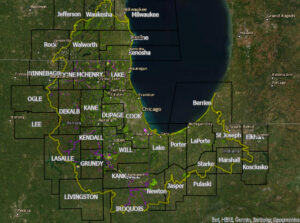


 We offer general operating and project grants to a diverse range of organizations and programs that further innovative and inclusive conservation efforts across the greater Chicago region through stewarding natural and working lands; integrating climate resilience; advancing policy advocacy; and providing benefits to both natural and diverse human communities. Guided by GDDF’s “Expanding the Conservation Toolbox” report, input from partners, worsening climate change impacts, and the unique conservation opportunities and challenges in the urban Chicagoland area, the strategy aims to leverage the Foundation’s resources to support strategic natural and working lands conservation with an increased focus on climate resiliency and equity. The Foundation also aims to achieve more comprehensive, longstanding outcomes beyond what traditional land protection activities can achieve, including amplifying advocacy work to improve conservation and land use policies and increase public funding for land conservation.
We offer general operating and project grants to a diverse range of organizations and programs that further innovative and inclusive conservation efforts across the greater Chicago region through stewarding natural and working lands; integrating climate resilience; advancing policy advocacy; and providing benefits to both natural and diverse human communities. Guided by GDDF’s “Expanding the Conservation Toolbox” report, input from partners, worsening climate change impacts, and the unique conservation opportunities and challenges in the urban Chicagoland area, the strategy aims to leverage the Foundation’s resources to support strategic natural and working lands conservation with an increased focus on climate resiliency and equity. The Foundation also aims to achieve more comprehensive, longstanding outcomes beyond what traditional land protection activities can achieve, including amplifying advocacy work to improve conservation and land use policies and increase public funding for land conservation.
Partnerships, convenings, technical assistance, and collaborations that accelerate and enhance the priorities of the strategy are also eligible for grants and other support.
This objective aims to support organizations and projects advancing innovative stewardship activities on natural or working lands that provide both ecological and ecosystem service benefits. Expanding the Toolbox examples include riparian area restoration in flood prone communities, conservation opportunities on agricultural land, habitat corridor conservation in transportation and utility rights of way, and utilizing carbon offset strategies to fund and increase the scale of land conservation.
This objective aims to support the incorporation of climate resiliency considerations in all programs and projects, recognizing that resiliency opportunities will be at various parcel sizes, involve varying land uses, and provide a range of benefits. Examples include using climate resiliency mapping and research in acquisition and stewardship planning and prioritization, protecting and restoring strategic parcels to increase habitat corridors and connectivity to other protected or stewarded areas, working in vulnerable communities to mitigate climate and flooding impacts using land conservation strategies, and advancement of nature-based green infrastructure and other land conservation strategies as a resilience tool.
This objective aims to support the utilization of policy advocacy, public engagement, and communications strategies to enhance land conservation programs and projects. Examples include educational advocacy efforts for the application of current and the development of new public conservation programs and funding, including at the state and local level, to support land conservation and other resiliency-related work. Other examples include land use planning advocacy related to public infrastructure investments, industrial development, and other proposed land use activities that could impact land protection efforts at scale, along with strategic communication and engagement campaigns that complement relevant conservation activities and influence public policy on land conservation and resiliency.
This objective aims to increase the relevance and reach of land conservation work by supporting inclusive efforts that provide both ecological and human well-being benefits, including for the diverse human communities across the region. There are significant opportunities to advance diversity, equity, and inclusion in the land conservation field, which the Foundation has already taken several steps to address, but we must continue these efforts. Examples include providing philanthropic support to BIPOC-led organizations and programs that advance or intersect with land conservation and resilience strategies, in addition to traditional conservation organizations which demonstrate a commitment to equity in their administration and programmatic work and who meaningfully engage with and align the needs of historically underserved communities in land conservation.
The Gaylord and Dorothy Donnelley Foundation has two grant cycles each year. Our 2024 proposal deadlines are Friday, March 29 (Spring Cycle) and Friday, July 26 (Fall Cycle).
First-time prospective applicants or groups that haven’t received a conservation grant in the last three years must contact Rebecca Judd, Conservation Program Officer at rebecca@gddf.org with as much notice as possible before applying. For some prospective applicants, additional time or considerations may be warranted, and a future proposal deadline may be more appropriate.
Current grantees, you will hear from us in advance of your final report date to discuss renewal options or updated projects.